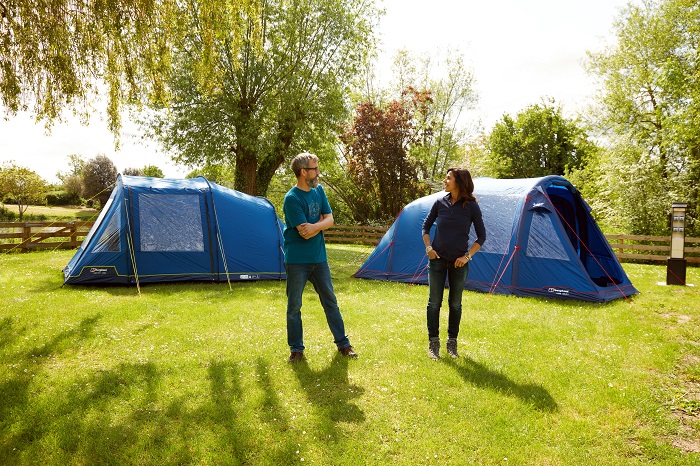Trying to decide which tent is best for you? Want to know the key differences between an air tent and a pole tent? We pitch Camping and Caravanning Club president and Peter Storm ambassador Julia Bradbury against our very own camping expert Ian, to see which will come out on top!
When it comes to camping, one of the essential decisions you’ll make is selecting the right tent. Among the various options available, two popular choices are air tents and pole tents. But what are the key differences between air tents and pole tents? Each type offers its unique advantages and considerations, catering to different camping preferences and needs. Below we’ll explore the characteristics of air tents and pole tents, helping you make an informed decision for your next camping adventure!
Pole Tents
Pole tents, also known as frame tents or traditional tents, rely on a framework of rigid poles made of materials like aluminium, steel, or fiberglass. These poles create a structural framework that supports the tent fabric.
Advantages of Pole Tents
- Smaller Packsize: Pole tents generally have a smaller pack size than air tents, meaning they take up less space in your car or when storing them
- Price: A pole tent is often the cheaper option if you’re looking to save money
- Spaciousness: Pole tents often offer more headroom and interior space compared to air tents due to their design and the ability to incorporate taller centre poles
Disadvantages of Pole Tents
- Setup Time: Setting up pole tents can take longer than air tents due to the assembly of multiple poles and attachment of the fabric
- Difficulty: Pole tents can be difficult to set up and are probably not a good option if you are going camping by yourself


Air Tents
Air tents, also known as inflatable tents, utilise air-filled beams instead of traditional rigid poles for structural support. These tents typically have inflatable tubes made of durable materials such as PVC or TPU, which are inflated using a pump. The inflated beams create a stable structure that holds up the tent.
Advantages of Air Tents
- Quick and Easy Setup: Air tents are generally faster to set up compared to pole tents. Inflating the beams can be pumped up relatively quickly, so air tents are quicker to pitch and take down than pole tents
- Robust: Air tents are pretty difficult to break. Because they don’t have any poles (which are normally the weakest link in a traditional tent), air tents can provide good stability and resistance to wind and other weather conditions
Disadvantages of Air Tents
- Heavy: Because of the robust materials manufactures use to ensure air tents don’t puncture, air tents can be quite heavy compared to pole tents
- Price: Air tents are often more expensive than pole tents, so if you’re on a budget, pole tents are the cheaper option

Choosing the Right Tent for You
The decision between an air tent and a pole tent ultimately depends on your specific camping preferences and needs. Consider the following factors when making your choice:
1. Cost and Frequency: If you’re a frequent camper or embark on extended trips, the ease and efficiency of an air tent might be appealing and the higher cost may be more worthwhile. For occasional campers, or for those on a budget, a lower-cost pole tent could be a better fit.
2. Portability vs. Durability: Evaluate whether lightweight portability or robust durability is a higher priority for your camping adventures. Air tents are usually heavier, so consider this before purchasing. A small pole tent may be a better option if you’re a backpacker or a campers who is constantly on the move. Both tent types offer great durability, as you as you buy a high quality tent form a reputable retailer!
3. Setup Time and Familiarity: Remember air tents are much quicker to set up than pole tents, but you will need a pump. Our air tents all come equipped with a hand pump for pumping your air beams up, or some people like to use an electric pump for even more speediness! If you’re more of a traditional camper and prefer to stick to what you know, a pole tent may be more ideal.

Looking for more inspiration? Head to our blog to read more unbeatable content from us!
